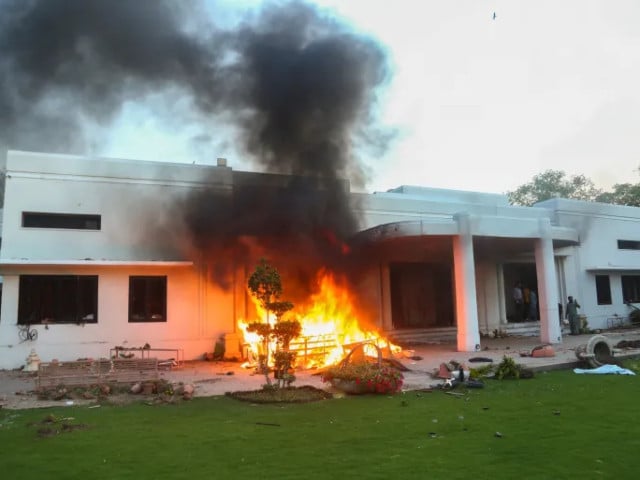Recently, an anti-terrorism court (ATC) in Lahore has ordered the Camp Jail superintendent to hand over 16 people to the Army for initiation of trials in military courts for their alleged involvement in the May 9 violence and attack on the corps commander’s residence commonly known as Jinnah House. According to the initial investigation, the accused persons which also includes a former PTI’s MPA are prime facie found involved with the commission of offenses under the provisions of the Official Secrets Act, 1923, and the Pakistan Army Act 1952.
The Pakistani nation had witnessed unprecedented lawlessness and vandalism on May 9, by the violent protestors allegedly belonging to the Pakistan Tahreek-e-Insaf (PTI) following the arrest of the PTI Chairman Imran Khan. The violent mobs vandalized public and state properties and Military Central Headquarters commonly known as the GHQ in Rawalpindi, corps commander’s residence in Lahore even did not spare the war memorials and Shuhadas’ monuments across the country. The army had termed the events of May 9 a dark chapter and announced its intent to try the protesters under relevant military laws to ensure justice so no other dare to teorya such henious acts in the future.
Pakistani authorities are of the view that the Army Act of 1952 empowers the government to establish military courts primarily to try members of the military or enemies of the state. Meanwhile, civilians accused of offenses such as spying, waging war against the armed forces or law enforcement agencies, attacking military installations, or inciting mutiny, can be tried in military courts.
However, there is a wide difference on the issue of military courts with in the ruling coalition partners, while the PTI has challenged trial of its workers/supporters by the military courts in the supreme court of Pakistan. The Amnesty International also expressed its concerns over the decision to try May 9 rioters under the Army Act, and termed it a clear violation of international law. Meanwhile, other human rights groups including the UN High Commissioner for Human Rights has condemned Pakistan’s plans to prosecute civilians involved in May 9 protests under the Army Act.
In fact, Pakistan has extensive judicial system in placed along with special ATC courts to deal with terrorism related cases while additional courts, specilized investigation and prosecution staff can be employed to ensure delivery of 100% justice. However, constitution of military courts would caused multiple legal, constitutional, political and raputational issues for the country. There will be global repurcussions of this issue including negative affect over Pakistan’s GSP plus status in the EU.The military has already faced social media propaganda due to politicians, hence disassociating this prestigious national institution from the ongoing political tussle would be great service to the nation.







